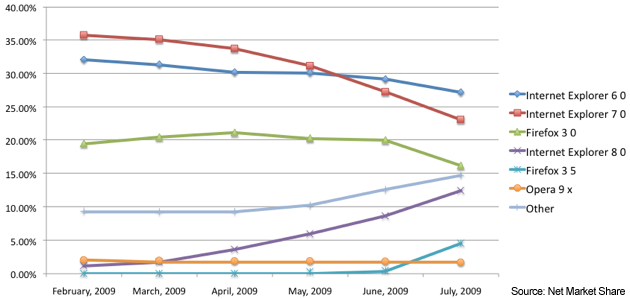 Net Applications has just released its latest report on browser usage, covering the months of June and July. The results show the impact of the launch of Firefox 3.5 on the browser market, as well as the steady decline of Internet Explorer 6 and 7 as they give way to IE8 and other browsers.
Net Applications has just released its latest report on browser usage, covering the months of June and July. The results show the impact of the launch of Firefox 3.5 on the browser market, as well as the steady decline of Internet Explorer 6 and 7 as they give way to IE8 and other browsers.
Firefox 3.5, which didn’t officially launch until June 30th, now claims 4.54% of the browser market, though most of these new users were likely previously on Firefox 3.0, which dropped from 20.03% in June to 16.21% in July. Internet Explorer 6 and 7 continue to see their user-bases fade (which is a decidedly good thing, especially in the case of IE6), and it seems that many (though not all) of these are heading to IE8. IE6 dropped from 30.15% in May to 27.21% in July, while IE7 saw a drop from 31.16% to 23.09% in the same time frame. IE8 has grown from 5.95% in May to 12.46% in July.
Adding all versions of Internet Explorer together, Microsoft’s market-share has remained fairly stable over the last few months — it dropped to 67.77% in April, then rose to 68.32% by June, and has since dipped back down to 67.68%. It’s certainly not going upwards, but it’s no longer hemorrhaging users the way it was last fall, when it dropped from 74.18% to 69.72% between September 2008 and January 2009 (other reports have shown major losses for IE more recently).
Likewise, Firefox is also holding fairly stable, dropping from 23.84% in April down to 22.75% and hovering around there since (for July it was at 22.47%). Any downturn in Firefox’s growth can likely be chalked up to the growth being seen by Safari and Chrome, both of which still represent relatively small but steadily growing user bases. Safari has risen from 3.53% to 4.07% between April and July, while Google Chrome has risen from 1.79% to 2.59% in the same time frame.
This report is also notable because it represents a change in the way NetMarketShare analyzes browser usage. Before now, Net Applications only reported its raw stats, without taking into account how disproportionally measured countries could skew results. Now the site has started to weight traffic data based on the number of Internet users in a given country (the impact of a user measured in China will be greater than one measured in the US, for example). Worth noting are some of the changes Net Applications has seen resulting from the weighting change. From the Net Applications site:
Baidu – Baidu goes to 9% of global search engine usage. Baidu is on a major growth curve, which is affecting the relative share of all other search engines.
Google – Because of Baidu’s growth, Google’s global share is actually going down. This is almost completely due to Baidu and does not reflect the rest of the world.
Apple – Since Mac share in the U.S. in significantly higher than the rest of the world, Mac and Safari share drop in the global reports.
Opera – Opera goes up to 2% in global reports. This reflects the significant share they have in Eastern Europe and Asia.

